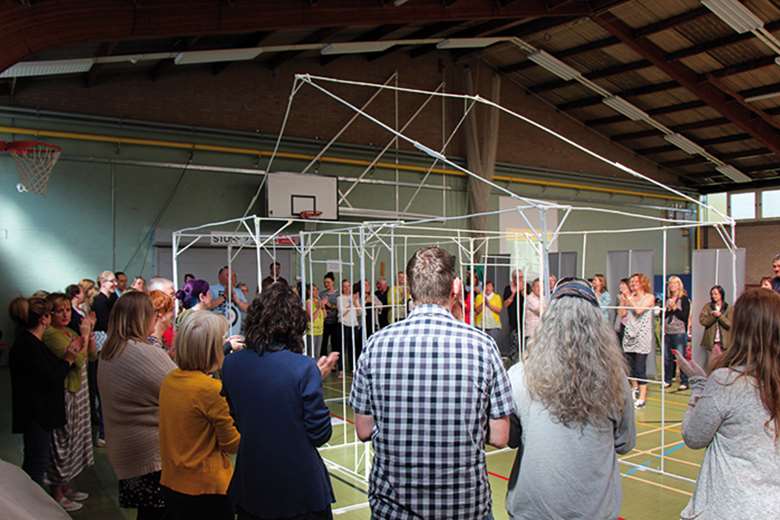The Mulberry Bush School
Derren Hayes
Thursday, June 29, 2017
Residential school that caters for troubled children has introduced methods that focus on helping children express their feelings and come to terms with past trauma.

- Approach uses a range of de-escalation techniques to help children verbally express themselves and reduce instances of violence and aggression
- Since being introduced, the number of physical restraint incidents has reduced and children's academic progress has improved
ACTION
Children aged from five to 13 with severe behavioural problems and emotional and mental health difficulties are referred to Oxfordshire-based The Mulberry Bush School, by local authorities across England and Wales. To complement the Level 5 training for all staff - the Foundation Degree in Therapeutic Work with Children and Young People - the specialist residential school provider has in recent years adopted Team Teach as the model of de-escalation and physical intervention.
The Mulberry Bush director John Turberville says children are often referred after local authorities have exhausted all other options for how to best deal with them.
"They may have been excluded from school, sent to a pupil referral unit or be out of education altogether," he explains. "They may have displayed inappropriate behaviour in school, been violent, started fires. The behaviour they display usually creates high levels of anxiety in others, but we see it as a communication of unmet needs."
Turberville says that often the children come from families that are in crisis or have broken down, or their foster care placements are at risk due to their difficult behaviour. The complex nature of the children's behaviour can also result in professionals giving different assessments of what the problems are, which can add to the complexity and frustration.
The average stay for children at The Mulberry Bush is three years; it does not usually accept referrals for those over 10 because "the culture here is quite young", says Turberville. The aim of the service is to integrate children back into living in a "stable home". It works intensively with the child in the residential setting for 38 weeks of the year and by providing outreach support to parents and carers during term time and for the remaining 14 weeks of the year. Another house on the same site is currently being constructed to take some children for 52 weeks a year.
When children arrive, they can display dangerous behaviour to themselves, other pupils and staff. It is for this reason that the school introduced Team Teach, an approach to working that focuses on using de-escalation techniques to address children's behaviour 95 per cent of the time, minimising the use of physical intervention.
The approach teaches staff about verbal and non-verbal de-escalation techniques and in what circumstances they should be deployed. It helps staff and services recognise what the appropriate response should be to disruptive, angry and aggressive behaviour - the aim is to avoid physical restraint if at all possible.
Turberville says children's behaviour can be fuelled by anxiety linked to emotional events, and Team Teach emphasises the need for practitioners to help them explore and analyse feelings, "giving words and labels for them".
"Almost all of the children referred to us are in local authority care and most will have had very traumatic experiences in the first few years of life, perhaps witnessing substance misuse, domestic violence or experiencing abuse," he says. "Many will have seen these things before they were pre-verbal - it can create confusion about what love really is."
All staff at The Mulberry Bush have basic training in Team Teach, while education and "group living" staff receive training in advanced personal safety techniques, such as positive handling strategies, graded holds and safe escorting.
Part of the training process sees staff analyse their own emotional resilience, Turberville explains. "They need to have dealt with any issues in their own lives so that they don't bring these into the relationships with children. In interviews, we ask applicants to explain when they have been pushed to their limits - we want to know how they cope. Every person has a limit and we need to know what they do beyond that because they will have to face that when here."
Despite the highly demanding nature of the work, staff turnover at The Mulberry Bush is around half the average for the sector, he says.
IMPACT
The Mulberry Bush uses its own Emotional/Social Assessing Pupil Progress tool and standardised assessment tools, such as the Boxall Profile, Target Tracker and Story Stem Assessment Profile to measure the progress children make.
Target tracker shows children educated at the residential school are making greater progress in reading and maths than peers in other schools - they made between 13 and 33 months progress over a six-month period.
Children's social and emotional progress is also measured weekly, with results reviewed by the staff group on a monthly basis to identify strengths and areas that still need work. Four out of five children either achieved or exceeded their target outcomes.
In addition, independent research to be published this year states that "children's improving behaviour during their time at The Mulberry Bush also means they have significantly fewer aggressive and anti-social incidents - that is, fewer incidents of physically hurting others, bullying and racism, damage and self-harm".
In addition, the home runs a skills awards system that enables children to gain badges for achieving good work. In the two years it has been running, 90 badges have been awarded.




